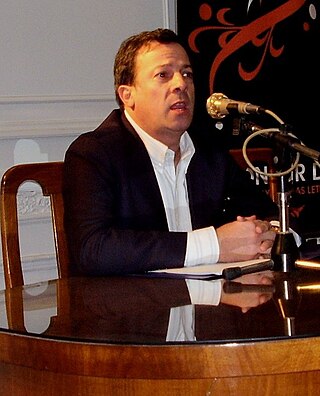
Shawiya, or Shawiya Berber, also spelt Chaouïa, is a Zenati Berber language spoken in Algeria by the Shawiya people. The language's primary speech area is the Awras Mountains in Eastern Algeria and the surrounding areas, including parts of Western Tunisia, including Batna, Khenchela, Sétif, Oum El Bouaghi, Souk Ahras, Tébessa and the northern part of Biskra. It is closely related to the Shenwa language of Central Algeria.
The Chaoui people or Shawyia are a Berber ethnic group native to the Aurès region in northeastern Algeria.
Abdelkebir Khatibi was a prolific Moroccan literary critic, novelist, philosopher, playwright, poet, and sociologist. Affected in his late twenties by the rebellious spirit of 1960s counterculture, he challenged in his writings the social and political norms upon which the countries of the Maghreb region were constructed. His collection of essays Maghreb pluriel is one of his most notable works.
Fatima Gallaire, née Bourega, was a Franco-Algerian playwright and author of short stories, who wrote in French. Born in Algeria, she held degrees in French Literature from the University of Algiers, and in Cinema from Paris 8 University. She wrote over twenty plays, many of which have been translated and performed in languages including English, Italian, German, Spanish and Uzbek. These include Princesses, translated as You have come back, and Les Co-épouses, translated as House of Wives. She received the Arletty Prize for Drama in 1990 and the Académie française AMIC award in 1994.

Salim Jay is a Franco-Moroccan novelist, essayist and literary critic living in France. He has written about 20 books, numerous essays and more than thousand newspaper articles.

Jean Paulhan was a French writer, literary critic and publisher, director of the literary magazine Nouvelle Revue Française (NRF) from 1925 to 1940 and from 1946 to 1968. He was a member of the Académie française. He was born in Nîmes (Gard) and died in Paris.

Alain Rey was a French linguist, lexicographer and radio personality. He was the editor-in-chief at French dictionary publisher Dictionnaires Le Robert. His wife, Josette Rey-Debove, was also his colleague.

Carlos Alvarado-Larroucau is an Argentine-born French author.
The Turks in Tunisia, also known as Turco-Tunisians and Tunisian Turks, are ethnic Turks who constitute one of the minority groups in Tunisia.
Mohamed Bencheneb was an Algerian professor, writer and historian.

Mustapha Haciane, also spelt as Mustafa Haciane, is an Algerian novelist, playwright, and poet. His publications often tackle social issues.
The 2012–13 Algerian Ligue Professionnelle 1 was the 51st season of the Algerian Ligue Professionnelle 1 since its establishment in 1962. A total of 16 teams contested the league, with ES Sétif as the defending champions. The league began on September 8, 2012.
Noureddine Aba was an Algerian poet and playwright. His work mainly focuses on political themes, such as the Algerian revolution, the Arab–Israeli conflict and Nazi Germany. In 1990, he established the Fondation Noureddine Aba, which continues to present the annual Noureddine Aba Prize to Algerian writers.
Rabah Belamri was an Algerian writer.

Arezki Metref, is an Algerian writer, poet and journalist.
Djanet Lachmet is an Algerian novelist and actress.
Ug Zelmad, or Messaoud Ben Zelmat, presumed birth in 1894 in Tkoutt and died in 1921, was considered from 1917 to 1921 by the French authorities as a bandit of honor, and by the population of Aurès as a hero.
Djamila Debèche, sometimes written Debêche or Debbeche, was French-Algerian feminist writer. She was a pioneering journalist and novelist in Algeria, where she was one of the first women writers of the French colonial period.
Ahmed Mahsas was an Algerian militant in the nationalist movement against French Algeria.







